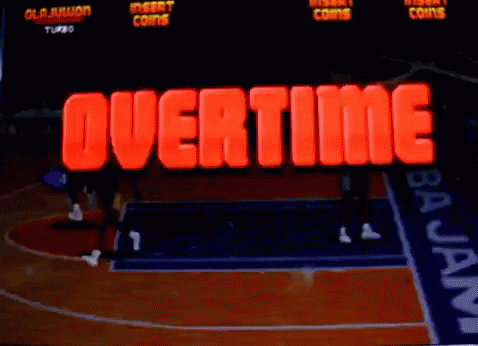11 May 2023 | Sales
Measuring Performance ≄ Developing Reps
By Gabrielle "GB" Blackwell

Never have I ever been given an outline or even a training on how competencies come into play at different stages of a reps’ development in role.
The only thing I’ve been shown is how to measure performance on a week to week, month to month, quarter over quarter basis.
But knowing how to measure performance ≄ developing rep proficiency or role expertise, right?
Instead, we need to understand how competencies show up throughout the entirety of a rep’s tenure in role, which ones to focus on, and when.
Since One on One caters to many different kinds of managers and sales motions, I’m going to lean heavily into an analogy so the content is as relatable as possible.
And if you’re wondering if this analogy is going to be a basketball themed one…
You bet your bottom dollar it is!
And with that…developing competencies is a lot like playing a four quarter game with overtime.
First Quarter: Getting the Right Team

The game changer during the first quarter of the game is making sure you have the right people on the court.
To get the right people on the court, identify which competencies are absolute must haves to being successful in the role. For example:
- Growth mindset
- Drive
- Solutions oriented
- Coachability
Remember, if you bring people onboard who do not have the essentials needed to do well in the role, you’re setting them — and yourself — up for failure.
Assist: Consider what level of experience you want your team to have and be mindful not to stack your team with too many “project” players. These “project” players who are high potential, but still require more hands-on coaching. Having one “project” player on your team is cool. Having a team of “project” players…not so much.
Second Quarter: Knowing the Playbook

Once you have the right people on your team, the next stage of development your reps will go through is learning how to play the game.
In basketball, this means learning the offensive and defensive playbook. In a sales role, learning how to play the game means knowing how to consistently execute against the process you want your reps to follow. This includes building proficiency in and adhering to things like:
- Data and pipeline hygiene standards
- Sales methodologies your company uses
- Talk tracks and messaging
- Service Level Agreements (SLAs)
- Leveraging your tech stack
Try to teach your reps your playbook as soon as possible…like within the first 90 days. The sooner they can start internalizing your plays and processes, the sooner you can get them to consistent performance.
Assist: A great way to gauge whether or not your reps are meeting development goals at this stage is by tracking their inputs and activity. Are they able to consistently meet their goals for calls or customer conversations week over week? Are they reliable in data and pipeline hygiene? If not, make sure they get the basics down before moving to the next stage of development.
Third Quarter: Building Court IQ

It’s one thing to work really hard or possess natural talent. It’s another thing to think critically, anticipate what’s going to happen next and make more effective decisions while performing. In basketball, we’d call this Court IQ.
In the third quarter of developing your rep’s competencies, the main focus is on building up your reps’ Sales Court IQ.
This means evolving from knowing…
- What to do
- How to do it
To understanding…
- Why things work
- How to make things better
The emphasis here is on building a greater level of insight and acumen. Look for:
- Deeply understands your product and customer challenges
- Identifies novel and innovative ways to drive efficiency in performance
- Clearly articulates where success comes from and how to scale it
- Proactively challenges the status quo of how success can be achieved
Assist: As a manager, you’ll be so much better off having reps share what’s working, what’s not, and what can be done to make things better. The easiest way to do this is to ask your reps “what are some ideas you want to put into action but haven’t tried yet?” This can be a very helpful question in encouraging your reps to rethink how they generate success.
Fourth Quarter: The Players are the Stars

In the final quarter of rep development, we’re really getting into the All Star status within the role. Typically reps at this stage demonstrate:
- Performance with efficiency
- Initiative in taking on additional projects that may or may not be directly related to the position they’re in right now
- A positive brand within and outside of the sales organization
To support your reps at this stage of their development lifecycle, look for:
- Projects you can delegate that will offer them growth and stretch opportunities
- Internal mentors to build their visibility in the organization
- Ways to offer or sponsor coaching services to your rep
Assist: I’d definitely lean into the mentorship and coaching opportunities you can expose your reps to if they’re in the final quarter of their lifecycle. It’s usually at this time where reps may be more receptive to competitive offers. One way you can differentiate yourself as a manager and employer is by providing access to mentorship and coaching opportunities.
Making the Extra Push

Once upon a time a mentor told me the job of a manager is to get their people to perform and then get them promoted.
The problem with this approach is that the promotion means absolutely nothing if your people move into a new role and absolutely sh*t the bed.
To be a truly great manager, you have to take it upon yourself to make sure your reps are not only the best candidates for promotion, but that when they get into their new role, they’re the best talent on that new team.
To do this, you’ll need to work with the hiring manager for the team your reps will be promoted to and understand the competencies for the roles on their team. Once you have that, you’ll see what competencies your rep is adept in and what competencies need to be developed.
The next step is to partner with the hiring manager to create a gap plan to close the development gap.
Assist: If your organization has a readiness program to support reps moving from one position to another – amazing! If not, no worries. Just make sure you and the hiring manager are aligned and agree on what the absolute must have competencies are for the role. If you and the hiring manager are in lockstep on competencies and readiness planning, you’ll give your reps the edge they need when potentially competing against more experienced, external hires.
In a Downturn, This is Even More Important
Especially in a downturn, there aren’t as many opportunities for internal mobility.
As managers, this means we need to be better than ever in preparing our people to be successful not just on our teams, but also prepare them even better for the next role. This way the company continues to maintain confidence in promoting internal candidates, especially from your team!